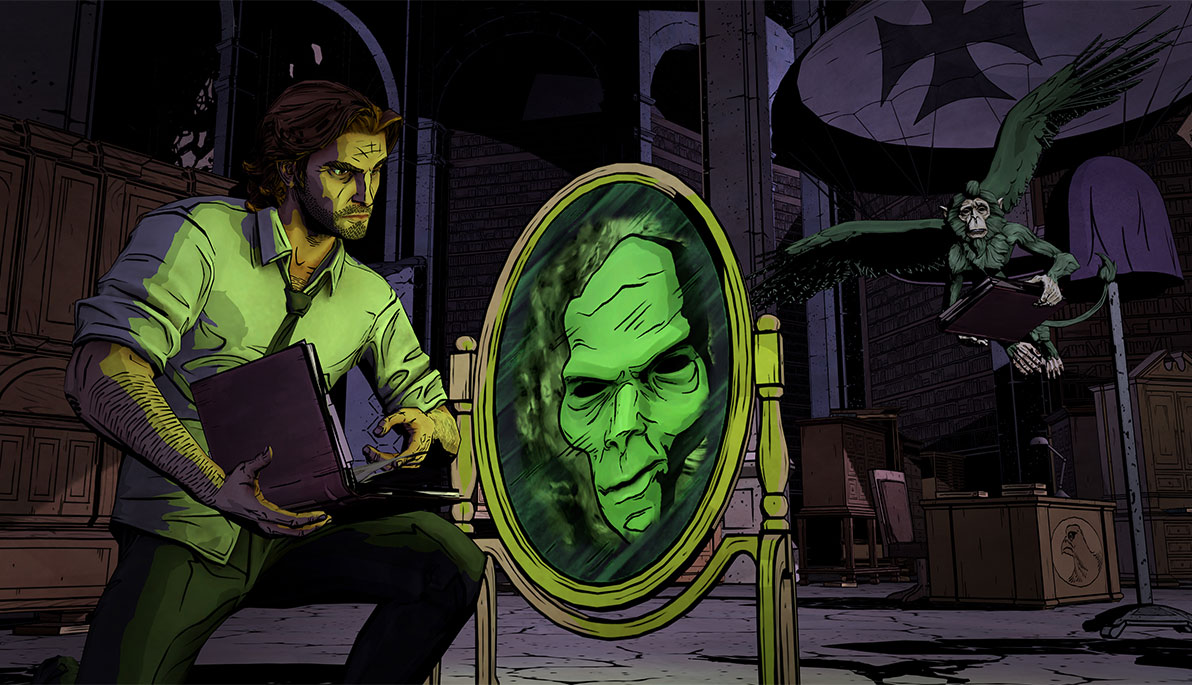
Once Upon a Game
July 10, 2017
Photo: Assistant Professor John Misak incorporates the video game, The Wolf Among Us, into his coursework to help students better understand the consequences of character decisions and connect them closer to the story’s narrative. Photo is courtesy of Telltale Games.
Hamlet, meet Grand Theft Auto.
That’s the approach Assistant Professor John Misak likes to take to teach the power of storytelling. By using the interactive nature of video games to complement more traditional study of popular works of literature and cinema in his writing classes, he is helping students broaden their understanding of character experiences.
“Video games can bring students closer to the personal narrative of the protagonists, enabling them to better experience different perspectives, emotions, and factors that weigh into character decisions that propel a story,” he says. “They introduce students to different modes of storytelling.”
One of the games he uses in his writing composition class is The Last of Us, which puts students in the role of Joel, a man charged with ensuring a young girl’s safety across a dangerous apocalyptic landscape. Before this adventure begins, however, Joel suffers a heartbreaking loss when his own daughter is killed.
This visceral experience immediately creates a powerful emotional connection early in the story—an essential technique used by writers to keep readers engaged. Misak wrote about the impact of The Last of Us and other games such as Heavy Rain and Grand Theft Auto in “Video Games as Narrative: Pedagogical Strategies for Using Games as Literature in the Composition Classroom,” which was published in the February 2017 issue of the SCIREA Journal of Education.
“After watching the main character, Joel, lose his daughter in a scene played by the player, students become emotionally involved, something they want from their [own] readers,” Misak wrote. “They continue with the game not just because of its stellar gameplay and tight controls; they want to move the story forward. Their readers should want to do the same with their stories, and this game can help instruct this.”

Assistant Professor John Misak
For his Detective Fiction class, Misak turned to the game The Wolf Among Us, which puts students into the mind of a detective investigating a murder in a dark fairy tale world (familiar territory for Misak, who has written several mystery and fantasy novels).
Architecture student Taylor Casey, who admits she rarely played video games growing up, appreciated the unique way this game added to her understanding of a character’s journey.
In The Wolf Among Us, players control the narrative and how their character interacts with others by choosing different dialogue options. “Whatever choice you selected would give you a different outcome,” says Casey. “So, you have more investment in the story. As opposed to what we passively read or see on a TV show, you bring your own life experiences into your character decisions.”
Casey and her classmates also shared personal stories that lead them to making certain choices in the game. “I never thought I would enjoy a video game on an intellectual and educational level,” she says.
B.S./D.O. student Abir Hossain says that Misak’s approach to teaching narrative technique through video games will help him connect with future patients. “One of the most important skills a doctor has is how they interact with patients,” he says. “When you play these characters in the game, you’re taking on different perspectives and getting new insights. When I’m dealing with patients as a D.O., I may be able to put myself in their shoes and understand what they may be thinking—as I might do when playing a game.”
But video games aren’t just putting players in the game. In Misak’s Foundations of Research Writing course, Hossain and his classmates discussed how they are also impacting the ways in which society consumes and processes information.
“It’s important to adapt to technology and reach towards different, more interactive mediums as a way to learn new things,” he says.
More Features

An Alumnus’ Commitment to the Environment
As an energy management graduate from New York Tech’s Vancouver campus, Jasdeep Gulati (M.S. ’22) is highly invested in educating people about environmental and climate sustainability.

Vancouver Faculty Win University-Sponsored Research Awards in New Program
The new Global Impact Research Grant (GIRG) program has been developed to keep Vancouver-based faculty connected to faculty and research projects being conducted on the university’s New York campuses.

Studying Climate Change One Degree at a Time
Junhua Qu (M.S. ’24) began her collegiate journey in Beijing. But, her interest in climate change took her to New York Tech’s Vancouver campus to study energy management.
